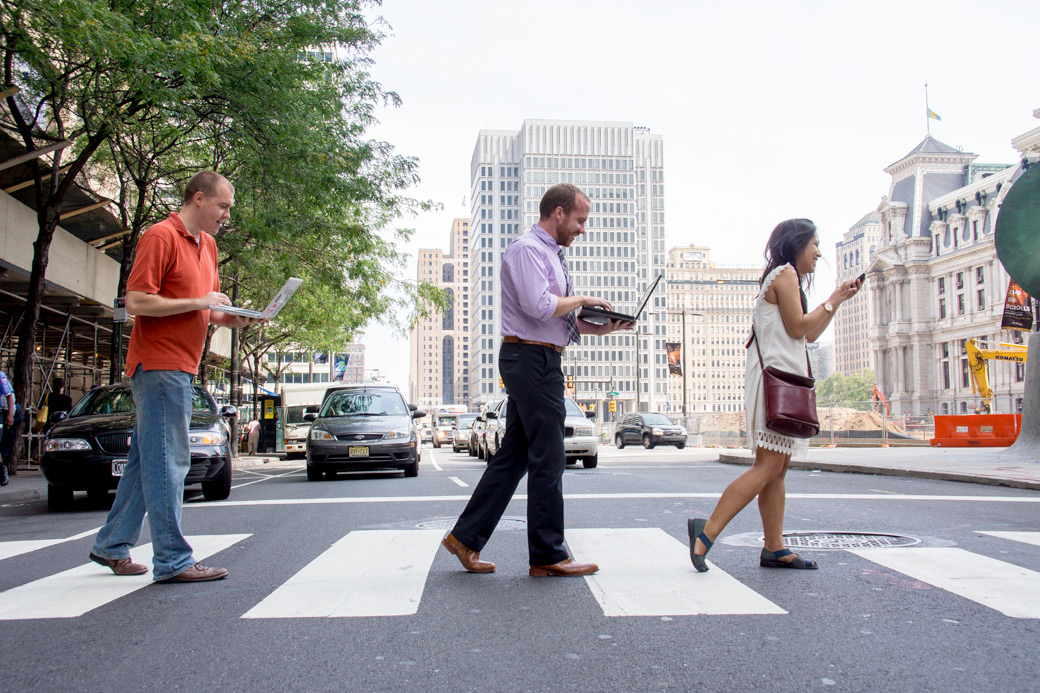
Philly Tech Week: celebrating momentum in technology and innovation
The founders of Technically Philly, Christopher Wink (left) and Brian Kirk (center) along with tech reporter Juliana Reyes (right) gear up for the third annual Philly Tech Week.
This year Azavea will launch the first-ever NASA International Space Apps hackathon during the kickoff weekend of Philly’s 2013 Tech Week, which celebrates the city’s innovation and technology community.
Taking place April 20-27, “Philly Tech Week Presented by AT&T” is organized by Technically Philly, a popular site that seeks to build a better Philadelphia through technology. Now in its third year, the event has become increasingly popular, bringing together people who work in entrepreneurship, digital access, coding, the creative arts and more.
Knight recently talked with one of the site co-founders, Chris Wink, about the growing success of Philly Tech Week, the city’s blossoming tech and mobile scene, and lessons that you can take to your city.
Why is it important that NASA chose Philly Tech as the place to launch its hackathon?
C.W.: Philly Tech Week has been a way to grow the awareness that Philadelphia’s technology and innovation community is vibrant and growing, so getting an organization like NASA to bring staff, resources and attention to that is an unmistakable success.
How does Philly Tech build on the city’s current tech landscape?
C.W.: I think three things are happening in the Philadelphia tech scene that make it work. First, there are collaborative physical spaces being developed where conversations can take place. Technically Philly is a news site, but we are physically located in a technology incubator. We’re here because when I go get coffee, I run into an investor or a technologist who I connect with and the conversation continues.
Second, we are broadening awareness of a common set of facts. We’re identifying who our leaders are and what success looks like. We’re talking about the challenges that we face collectively. Only when a community knows the facts can we come together and create a mechanism to both advance resources and fill the gaps.
Third, we are making time to self-reflect. When you’re in this tech space, it’s important to have people there that are challenging each other and celebrating together. We celebrate what has worked every April during Philly Tech Week.
Can you give examples of how mobile is impacting the city’s tech scene?
C.W.: One example is Connect Philly. With the help of a small grant from Knight, [it was] able to roll out an SMS that would show citizens where the nearest computer centers are – even in homeless communities SMS text is available. Now social services has a tool to help people find resources. Everywhere, people are looking at a gap and filling it with technology: for example there is Shelter.org for food pantries, and Philly SNAP – an SMS text tool where food stamps can be redeemed. It’s about taking information that’s somewhat easy to find and making it accessible by creating a web app for people who only have access to a mobile phone. With that being said, I think it is important that mobile conversation doesn’t become a bandaid for the digital divide. We still need to talk about why its important for all people to use and understand technology.
What can people in other communities learn from Philadelphia’s technology and innovation momentum?
C.W.: Fact – where you build your business matters less. The massive proliferation of communication tools over last 15 years has meant a reduction in what it costs to build a business. As a result, there has been an explosion of non-traditional tech hubs.
In Philly, you can operate at a much cheaper rate and with somewhat lower risk. It makes it easy to recruit the talent that will help address, though not necessarily solve, the deep issues we have. A lot of other markets can look at Philly and get lessons on building a tech community in a non-traditional hub.
If you could give one piece of advice to someone who has an idea for a startup, what would it be?
C.W.: Begin by asking yourself, ‘what is the worst case and what is the best case scenario of trying this idea’? Generally, the worst case is that no one cares, you do a bad job of it and ultimately learn some valuable lessons. The best case scenario is often that interest and attention grows and you do something you’re passionate about full time. More often than not, taking that risk is never as bad as the unknown. We torment ourselves with the unknown. My advice would be: don’t get lost in the details. The first step is finding and giving value. The rest you can figure out as you go.
Other events during Philly Tech Week will include: the second Women in Tech Summit, which brings together a diverse group of female entrepreneurial and coding groups to introduce and encourage more participation in the community; a keynote on the state of media and technology in underrepresented communities led by FCC commissioner Mignon Clyburn; and an open house for the Urban Apps and Maps studio at Temple University.
By Jenna Buehler, executive assistant/communications at Knight Foundation
Recent Content
-
Communitiesarticle ·
-
Communitiesarticle ·
-
Communitiesarticle ·


